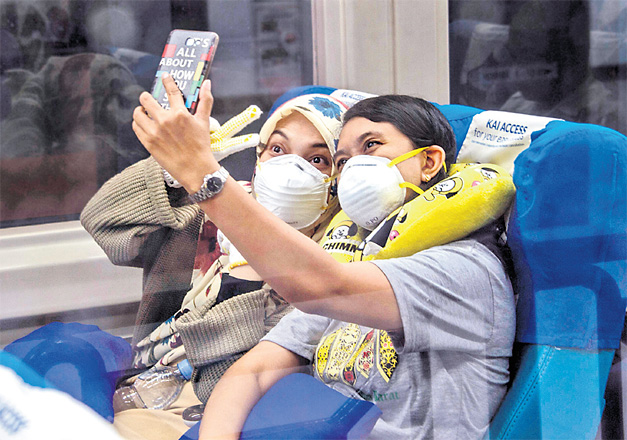The Economist in its latest edition titled ‘Dropping the Ball’ rightly mentions – “Talking down the issues is not winning strategy.” India with a population of about 130 crore has around 100 coronavirus cases and two deaths. The awareness created by the Union and State governments and the proactive prevention and curative measures, coupled with friendly hot weather in most parts of the country barring up-North, have stood in good stead.
But it is unfortunate for a slow-growth economy where inflation is down and IIP up that this new scare has caused market mayhem pulling it down to pre-1930 levels. Several weaklings and numerous of MSMEs could see the prospect of unpaid bills. It may be difficult for them to keep the labour engaged with obstructions to the moving machines, more particularly, the export-led ones. Time to seek way out is right now and not later.
Paid Sick Leave
Will it be possible for India to take the call of US democrats – notwithstanding its total unpreparedness and niggardly health system – “paid sick leave rules, expanded payments for programmes like unemployment insurance and the nutrition assistance, and guaranteed payment of all testing and out-of-pocket costs”?
In fact, McKinsey’s March 9, report, anticipates that the global GDP growth in 2020 could fall as deep as -1% to -1.5% even if socio-economic impacts get localised and effective and timely countermeasures are initiated.
A large number of NRI families in several countries — Middle East, UK, US, Canada, New Zealand just to cite a few — are all dependent on imports for their essential food requirements. China and India have been their source. Now that the flights have stopped; visas have been cancelled, and even local movements in several nations restricted, the information is that all big malls like Lulu, Walmart, etc, have even emptied their stocks!
Rising Unemployment
The 73rd NSS 2015-16 mentions that 110 million were employed in the MSME sector. This is despite the sector’s inhibition to disclose the actual number employed for saving regulatory costs and the countless contract labour engaged to keep themselves afloat in the market competitively. According to the RBI Governor, around 50% cent of the total MSMEs operate in rural areas and provide 45 per cent of total employment. Therefore, industrial hygiene needs to improve significantly.
Micro enterprises, which account for 97% of the total employment in the MSME sector, in the context of Covid -19, faces most of the heat. Even if banks have restructured or revived them in the recent past, they should be given further restructuring by way of reduced instalments elongated dues in their working capital accounts.
India is uniquely fortunate thanks to the hot climate catching up down the Vindhyas and in a month even the North would see about 30 degrees. Moreover, with adequate stocks of foodgrains, starvation will be afraid of staring at us unless we mismanage public distribution. Opportunity awaits the MSMEs but their preparedness needs unstinted support from the lenders – be it banks or NBFCs.

Active Banks
Banks cannot be sitting ducks talking of collateral security and failing to convert risk into reward at the right time. Industry associations should aggressively put their strategies in position and rebuild trust between their member entrepreneurs and lenders. The time is for more leg work; more buyer-seller meets; more enterprises must adopt affordable ERP and move to digital platforms because these platforms alone enable speed of transaction and delivery.
Second, they should also be handheld for capturing the local domestic market to the maximum extent by coordinating with the State government concerned under the public procurement policy. The unmoved stocks thus should be quickly turned into cash.
MSMEs should be made not merely preferred creditors under IBC and NCLT but should also get at least 75% of the pendency cleared within 30-60 days of accepting the case on merits. Third, the moratorium period for the new MSMEs and restructuring in manufacturing should be extended by six months to ward off project and cost overruns.
The MSMEs financed by the NBFCs and digital payment platforms should quickly reassess the status of the loans from a practical point of view by speaking to the entrepreneurs concerned to resolve any payments likely to get stuck due to Covid-19.
Worst Hit
The services sector, where the banks and NBFCs lent heavily under retail market and MSME (services) portfolios, would be worst hit. Training-led conferences and seminar-dedicated institutions, which run mostly on promised payments from their hosts, would renege on payments as they are either not held or least attended.
Here, along with the earlier manufacturing MSME credit, it is important that the RBI quickly takes corrective policy decisions and guide banks, financial institutions and NBFCs to postpone NPA thresholds to 120 days and review the position at the end of April, 2020.
Banks beleaguered as it is due to unsustainable NPA levels would be worst hit if Covid-19 impacts their assets right away. Globally, central banks are already ahead of the curve in providing relief to the financial sector both through the zero/least interest rates for bond and credit markets and even Basel may be moving in some unusual remedial stand.
“One scary thing facing us is demand contraction. People will buy only essential goods. New purchase orders will drop further. Payment cycles will get disrupted. Job losses are ahead. All this could be a possible fallout of coronavirus. Also, the loss of GDP may be equivalent to one month of GDP,” says Sameer Kochhar of Skoch Group. But production cannot stop if employment is to be preserved and future demand is to be adequately met.
‘When winter comes, can spring be far behind’? Next monetary policy, notwithstanding comfort on inflation headwinds, could see a rate cut. At least the Chief Economic Adviser asked for it!
No comments:
Post a Comment